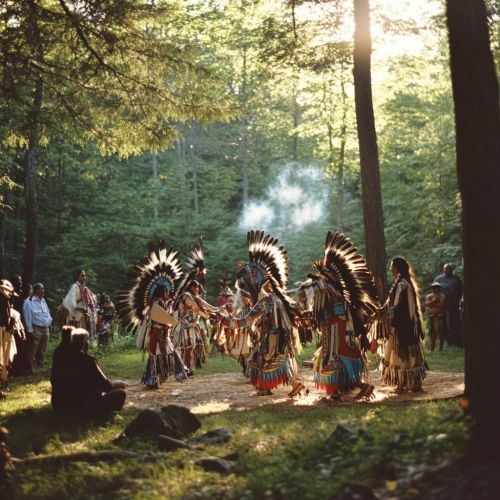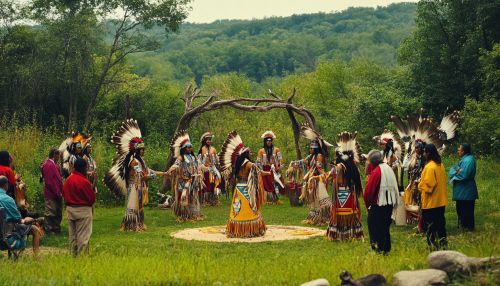Native American Mythology
Introduction
Native American mythology encompasses the rich and diverse set of myths, legends, and spiritual beliefs held by the indigenous peoples of North America. These traditions vary widely among different tribes and regions, reflecting the unique cultures, environments, and histories of each group. This article delves into the intricate tapestry of Native American mythology, exploring its themes, characters, and cultural significance.
Cosmology and Creation Myths
Native American cosmology often centers around the creation of the world and the origins of humanity. Creation myths are foundational stories that explain how the world and its inhabitants came into existence. These myths are deeply intertwined with the natural world and often feature animals, plants, and celestial bodies as central characters.
The Great Spirit
Many Native American tribes believe in a supreme being known as the Great Spirit or Wakan Tanka in the Lakota tradition. The Great Spirit is often seen as the creator of the universe and the source of all life. This deity is typically depicted as a benevolent force that governs the natural world and maintains balance and harmony.
The Earth Diver Myth
One of the most widespread creation myths among Native American tribes is the Earth Diver myth. In this story, the world is initially covered in water, and a divine being or animal dives into the depths to retrieve a small amount of earth. This earth is then used to create the land. Variations of this myth can be found among the Ojibwe, Cherokee, and many other tribes.
The Emergence Myth
Another common creation story is the Emergence myth, which describes how the first people emerged from an underground world into the present world. This myth is prevalent among the Navajo and Hopi tribes. The Emergence myth often involves a series of worlds or levels that the people must pass through, each with its own challenges and lessons.
Deities and Spirits
Native American mythology features a rich pantheon of deities and spirits, each with their own distinct characteristics and roles. These beings are often associated with natural elements, animals, and celestial bodies.
Trickster Figures
Trickster figures are a common motif in Native American mythology. These characters, such as Coyote in the Southwest and Raven in the Pacific Northwest, are known for their cunning and mischievous behavior. Tricksters often serve as cultural heroes, teaching important lessons through their actions and adventures.
Animal Spirits
Animals play a significant role in Native American mythology, often serving as messengers, guides, and protectors. Many tribes believe in animal spirits or totems that embody specific qualities and traits. For example, the Bear is often associated with strength and healing, while the Eagle represents vision and spiritual insight.
Nature Spirits
Nature spirits are revered in many Native American traditions. These spirits inhabit natural features such as rivers, mountains, and forests. The Anishinaabe people, for example, believe in the Manitou, a spiritual force that resides in all things.
Mythological Themes
Native American mythology is rich with themes that reflect the values and beliefs of the cultures from which they originate. These themes often emphasize the interconnectedness of all life, the importance of balance and harmony, and the reverence for nature.
The Circle of Life
The concept of the Circle of Life is central to many Native American belief systems. This theme reflects the cyclical nature of existence, where life, death, and rebirth are interconnected. The Lakota people, for example, view the circle as a symbol of unity and continuity.
The Hero's Journey
The Hero's Journey is a common narrative structure in Native American myths. This journey often involves a young hero who embarks on a quest, faces challenges, and ultimately achieves a greater understanding of themselves and their place in the world. The Navajo story of the Monster Slayer is a prime example of this theme.
Transformation and Renewal
Transformation and renewal are recurring motifs in Native American mythology. These themes are often depicted through stories of shape-shifting, reincarnation, and the changing seasons. The Hopi Kachina dances, for instance, celebrate the renewal of life and the changing of the seasons.
Rituals and Ceremonies
Rituals and ceremonies play a vital role in Native American cultures, serving as a means of connecting with the spiritual world and honoring the myths and legends passed down through generations.
Vision Quests
A vision quest is a rite of passage in many Native American tribes. During a vision quest, an individual seeks spiritual guidance and insight through fasting, prayer, and solitude. This practice is particularly significant among the Lakota and Cheyenne peoples.
The Sun Dance
The Sun Dance is a ceremonial dance practiced by several Plains tribes, including the Sioux and Blackfoot. This ritual involves dancing, fasting, and sometimes self-sacrifice, and is performed to honor the Great Spirit and seek blessings for the community.
Potlatch
The Potlatch is a ceremonial feast practiced by the indigenous peoples of the Pacific Northwest, such as the Tlingit and Haida. This event involves the giving of gifts, storytelling, and the reaffirmation of social status and community bonds.


Oral Tradition and Storytelling
Oral tradition is the primary means by which Native American myths and legends are preserved and transmitted. Storytelling is a revered art form that serves to educate, entertain, and instill cultural values.
Storytellers
Storytellers hold a respected position within Native American communities. They are the keepers of knowledge and tradition, responsible for passing down stories from one generation to the next. The Zuni people, for example, have a long tradition of storytelling that includes elaborate tales of gods and heroes.
Sacred Stories
Sacred stories are those that hold particular religious or spiritual significance. These stories are often recited during ceremonies and rituals, and are considered to be a direct link to the divine. The Iroquois creation myth, which tells of the Sky Woman and the creation of the earth, is an example of a sacred story.
Legends and Folktales
In addition to sacred stories, Native American mythology includes a wealth of legends and folktales. These stories often feature moral lessons, cultural heroes, and explanations for natural phenomena. The Cherokee legend of the Uktena, a giant serpent, is a well-known example.
Influence and Legacy
Native American mythology continues to influence contemporary culture and thought. Its themes and stories are reflected in literature, art, and popular media, and it remains a vital part of the cultural heritage of Native American communities.
Contemporary Interpretations
Many contemporary Native American artists and writers draw inspiration from traditional mythology. Authors such as N. Scott Momaday and Leslie Marmon Silko incorporate mythological themes into their works, exploring the connections between past and present.
Cultural Revitalization
Efforts to revitalize and preserve Native American languages and traditions have led to a renewed interest in mythology. Programs aimed at teaching traditional stories and practices to younger generations are helping to ensure that these rich cultural heritages are not lost.
Popular Culture
Native American mythology has also found its way into popular culture, influencing movies, television, and literature. Films such as Smoke Signals and novels like House Made of Dawn bring Native American stories and themes to a broader audience.
See Also
References
- Erdoes, Richard, and Alfonso Ortiz, eds. "American Indian Myths and Legends." Pantheon Books, 1984.
- Gill, Sam D., and Irene F. Sullivan. "Dictionary of Native American Mythology." Oxford University Press, 1992.
- Bierhorst, John. "The Mythology of North America." William Morrow & Co, 1985.
